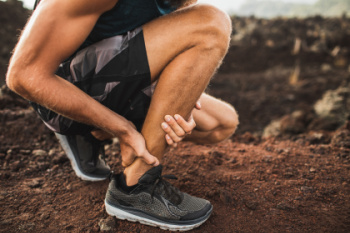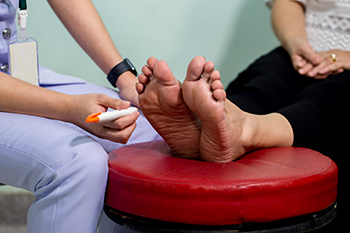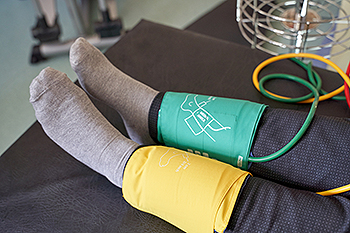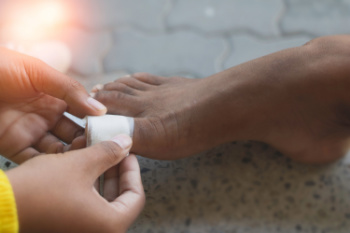Freehold (732) 294-9393
Freehold (732) 294-9393

Achilles tendon pain can arise from various causes and often affects the area where the Achilles tendon inserts into the back of the heel. The Achilles tendon is the largest tendon in the body, connecting the calf muscles to the heel bone, and facilitating activities like walking, running, and jumping. Common causes of Achilles tendon pain include overuse or repetitive strain, resulting in conditions such as Achilles tendinitis or tendinosis. These conditions involve inflammation or degeneration of the tendon due to excessive stress. Acute injuries such as Achilles tendon ruptures can occur from sudden, forceful movements, and are often accompanied by a popping sensation and severe pain. Treatment for Achilles tendon pain typically involves rest, compression, and elevation, in addition to medicine to help reduce pain and inflammation. Stretching exercises and custom-made orthotic devices may be recommended to improve flexibility and strength, which can help to support the Achilles tendon. In severe cases or ruptures, surgery may be necessary to repair the tendon. If you have a painful Achilles tendon, it is suggested that you schedule an appointment with a podiatrist for a proper diagnosis and treatment.
Achilles tendon injuries need immediate attention to avoid future complications. If you have any concerns, contact Dr. Henry Miller of New Jersey. Our doctor can provide the care you need to keep you pain-free and on your feet.
What Is the Achilles Tendon?
The Achilles tendon is a tendon that connects the lower leg muscles and calf to the heel of the foot. It is the strongest tendon in the human body and is essential for making movement possible. Because this tendon is such an integral part of the body, any injuries to it can create immense difficulties and should immediately be presented to a doctor.
What Are the Symptoms of an Achilles Tendon Injury?
There are various types of injuries that can affect the Achilles tendon. The two most common injuries are Achilles tendinitis and ruptures of the tendon.
Achilles Tendinitis Symptoms
Rupture Symptoms
Treatment and Prevention
Achilles tendon injuries are diagnosed by a thorough physical evaluation, which can include an MRI. Treatment involves rest, physical therapy, and in some cases, surgery. However, various preventative measures can be taken to avoid these injuries, such as:
If you have any questions please feel free to contact our office located in Freehold, NJ . We offer the newest diagnostic tools and technology to treat your foot and ankle needs.

Foot neuropathy, a common complication of various medical conditions such as diabetes, refers to nerve damage that affects sensation and function in the feet. One of the primary indicators of foot neuropathy is tingling or burning sensations in the feet, often accompanied by numbness or loss of feeling. This diminished sensation increases the risk of injury and can lead to unnoticed wounds or ulcers. Additionally, individuals with foot neuropathy may experience sharp or shooting pains, especially during movement or when pressure is applied to the affected areas. Muscle weakness and difficulty coordinating movements are also common symptoms, making it challenging to walk or perform routine tasks. Recognizing these signs early is essential for timely intervention and management to prevent complications. If you have any of the above symptoms, it is suggested that you are under the care of a podiatrist who can offer you relief and management tips.
Neuropathy
Neuropathy can be a potentially serious condition, especially if it is left undiagnosed. If you have any concerns that you may be experiencing nerve loss in your feet, consult with Dr. Henry Miller from New Jersey. Our doctor will assess your condition and provide you with quality foot and ankle treatment for neuropathy.
What Is Neuropathy?
Neuropathy is a condition that leads to damage to the nerves in the body. Peripheral neuropathy, or neuropathy that affects your peripheral nervous system, usually occurs in the feet. Neuropathy can be triggered by a number of different causes. Such causes include diabetes, infections, cancers, disorders, and toxic substances.
Symptoms of Neuropathy Include:
Those with diabetes are at serious risk due to being unable to feel an ulcer on their feet. Diabetics usually also suffer from poor blood circulation. This can lead to the wound not healing, infections occurring, and the limb may have to be amputated.
Treatment
To treat neuropathy in the foot, podiatrists will first diagnose the cause of the neuropathy. Figuring out the underlying cause of the neuropathy will allow the podiatrist to prescribe the best treatment, whether it be caused by diabetes, toxic substance exposure, infection, etc. If the nerve has not died, then it’s possible that sensation may be able to return to the foot.
Pain medication may be issued for pain. Electrical nerve stimulation can be used to stimulate nerves. If the neuropathy is caused from pressure on the nerves, then surgery may be necessary.
If you have any questions, please feel free to contact our office located in Freehold, NJ . We offer the newest diagnostic and treatment technologies for all your foot care needs.
 Peripheral artery disease, PAD, is a circulatory condition that significantly impairs the flow of blood to the extremities, particularly the feet. PAD can pose serious health risks and include symptoms that can drastically affect daily living. This condition results from the accumulation of fatty deposits in the arteries, causing them to narrow. This also causes a reduction in blood supply. People with PAD may experience various symptoms in their feet, including a notable decrease in temperature compared to the rest of the body, a change in skin color to a pale or bluish hue, diminished hair growth, delayed wound healing, and sores. Furthermore, PAD can lead to pain or cramping in the lower limbs during physical activities. This typically subsides with rest. The risks of PAD go beyond discomfort because the decreased blood flow heightens the risk of infection. Severe cases can lead to gangrene and the possibility of amputation. If you are suffering from PAD, it is suggested you seek the help of a podiatrist, or foot doctor, who can provide a personalized treatment plan and address any foot-related concerns.
Peripheral artery disease, PAD, is a circulatory condition that significantly impairs the flow of blood to the extremities, particularly the feet. PAD can pose serious health risks and include symptoms that can drastically affect daily living. This condition results from the accumulation of fatty deposits in the arteries, causing them to narrow. This also causes a reduction in blood supply. People with PAD may experience various symptoms in their feet, including a notable decrease in temperature compared to the rest of the body, a change in skin color to a pale or bluish hue, diminished hair growth, delayed wound healing, and sores. Furthermore, PAD can lead to pain or cramping in the lower limbs during physical activities. This typically subsides with rest. The risks of PAD go beyond discomfort because the decreased blood flow heightens the risk of infection. Severe cases can lead to gangrene and the possibility of amputation. If you are suffering from PAD, it is suggested you seek the help of a podiatrist, or foot doctor, who can provide a personalized treatment plan and address any foot-related concerns.
Peripheral artery disease can pose a serious risk to your health. It can increase the risk of stroke and heart attack. If you have symptoms of peripheral artery disease, consult with Dr. Henry Miller from New Jersey. Our doctor will assess your condition and provide you with quality foot and ankle treatment.
Peripheral artery disease (PAD) is when arteries are constricted due to plaque (fatty deposits) build-up. This results in less blood flow to the legs and other extremities. The main cause of PAD is atherosclerosis, in which plaque builds up in the arteries.
Symptoms
Symptoms of PAD include:
It is important to note that a majority of individuals never show any symptoms of PAD.
Diagnosis
While PAD occurs in the legs and arteries, Podiatrists can diagnose PAD. Podiatrists utilize a test called an ankle-brachial index (ABI). An ABI test compares blood pressure in your arm to you ankle to see if any abnormality occurs. Ultrasound and imaging devices may also be used.
Treatment
Fortunately, lifestyle changes such as maintaining a healthy diet, exercising, managing cholesterol and blood sugar levels, and quitting smoking, can all treat PAD. Medications that prevent clots from occurring can be prescribed. Finally, in some cases, surgery may be recommended.
If you have any questions, please feel free to contact our office located in Freehold, NJ . We offer the newest diagnostic and treatment technologies for all your foot care needs.

Blisters, though seemingly small, can wreak havoc on a runner's performance and comfort. Prevention is key to ensuring an enjoyable and pain-free running experience. This can begin by investing in properly fitted running shoes. Ill-fitting shoes can rub against the skin, causing friction and blisters. Additionally, moisture-wicking socks help keep feet dry and reduce the likelihood of blisters forming from sweat and friction. Gradually increasing mileage and intensity during training allows the skin to toughen gradually, decreasing vulnerability to blisters. It is also essential to address hot spots or areas of irritation immediately by covering them with a bandage to prevent further damage. If you have a blister on your foot that is bothersome or has become infected, it is suggested that you consult a podiatrist who can offer you relief and prevention methods.
Blisters are prone to making everyday activities extremely uncomfortable. If your feet are hurting, contact Dr. Henry Miller of New Jersey. Our doctor can provide the care you need to keep you pain-free and on your feet.
Foot Blisters
Foot blisters develop as a result of constantly wearing tight or ill-fitting footwear. This happens due to the constant rubbing from the shoe, which can often lead to pain.
What Are Foot Blisters?
A foot blister is a small fluid-filled pocket that forms on the upper-most layer of the skin. Blisters are filled with clear fluid and can lead to blood drainage or pus if the area becomes infected.
How Do Blisters Form?
Blisters on the feet are often the result of constant friction of skin and material, usually by shoe rubbing. Walking in sandals, boots, or shoes that don’t fit properly for long periods of time can result in a blister. Having consistent foot moisture and humidity can easily lead to blister formation.
Prevention & Treatment
It is important to properly care for the affected area in order to prevent infection and ease the pain. Do not lance the blister and use a Band-Aid to provide pain relief. Also, be sure to keep your feet dry and wear proper fitting shoes. If you see blood or pus in a blister, seek assistance from a podiatrist.
If you have any questions, please feel free to contact our office located in Freehold, NJ . We offer the newest diagnostic and treatment technologies for all your foot care needs.